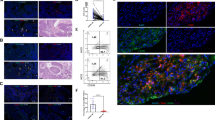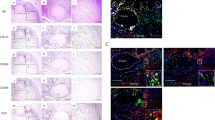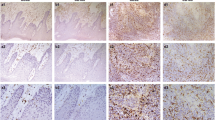Abstract
CD68 has been widely used as a pan-macrophage marker for tumor-associated macrophages (TAM) which always involve in carcinogenesis. But the correlations between CD68+ TAMs and prognosis of patients show to be inconsistent, which might due to lack of specific markers of TAMs. We here found that the microlocalization of CD68+ TAMs also played a unique role in prognosis of patients with oral squamous cell carcinoma (OSCC). CD68+ TAMs were identified in paraffin-embedded OSCC specimens (n = 91) by using immunohistochemistry. The number of CD68+ TAMs was remarkably increased from adjacent none-neoplasia tissues (NT) to tumor nest (TN), but tumor stroma (TS) was infiltrated with highest frequency of CD68+ TAMs (P < 0.0001). Unexpectedly, more CD68+ TAMs in TS, but not NT or TN, were associated with high tumor grade (P = 0.033), lymph node metastasis (P = 0.034), and shorter 10-year overall survival time, disease free survival. Considering TAMs was derived from monocytes in peripheral blood, we assessed the relationship between leukocytes in peripheral blood and CD68+ TAMs in OSCC and found that more CD68+ TAMs in TS were accompanied with decreased monocytes and lymphocytes in peripheral blood (P < 0.05). Although Cox regression analysis revealed that CD68+ TAMs in TS were not an independent prognostic factor for OSCC patients, we raised a possibility that the microlocalization of CD68+ TAMs was an indispensable factor for the advance of OSCC.




Similar content being viewed by others
References
Rao SK, Pavicevic Z, Du ZY, Kim JG, Fan MY, Jiao Y, et al. Pro-inflammatory genes as biomarkers and therapeutic targets in oral squamous cell carcinoma. J Biol Chem. 2010;285(42):32512–21. doi:10.1074/jbc.M110.150490.
Shi C, Pamer EG. Monocyte recruitment during infection and inflammation. Nat Rev Immunol. 2011;11(11):762–74. doi:10.1038/Nri3070.
Taylor PR, Martinez-Pomares L, Stacey M, Lin HH, Brown GD, Gordon S. Macrophage receptors and immune recognition. Annu Rev Immunol. 2005;23:901–44. doi:10.1146/annurev.immunol.23.021704.115816.
Ruffell B, Au A, Rugo HS, Esserman LJ, Hwang ES, Coussens LM. Leukocyte composition of human breast cancer. Proc Natl Acad Sci U S A. 2012;109(8):2796–801. doi:10.1073/pnas.1104303108.
Sica A, Schioppa T, Mantovani A, Allavena P. Tumour-associated macrophages are a distinct M2 polarised population promoting tumour progression: Potential targets of anti-cancer therapy. Eur J Cancer. 2006;42(6):717–27. doi:10.1016/j.ejca.2006.01.003.
Gottfried E, Kunz-Schughart LA, Weber A, Rehli M, Peuker A, Muller A, et al. Expression of CD68 in non-myeloid cell types. Scand J Immunol. 2008;67(5):453–63. doi:10.1111/j.1365-3083.2008.02091.x.
Chen JJW, Lin YC, Yao PL, Yuan A, Chen HY, Shun CT, et al. Tumor-associated macrophages: the double-edged sword in cancer progression. J Clin Oncol. 2005;23(5):953–64. doi:10.1200/Jco.2005.12.172. 23.
Koide N, Nishio A, Sato T, Sugiyama A, Miyagawa S. Significance of macrophage chemoattractant protein-1 expression and macrophage infiltration in squamous cell carcinoma of the esophagus. Am J Gastroenterol. 2004;99(9):1667–74. doi:10.1111/j.1572-0241.2004.30733.x.
Ryder M, Ghossein RA, Ricarte JCM, Knauf JA, Fagin JA. Increased density of tumor-associated macrophages is associated with decreased survival in advanced thyroid cancer. Endoc-Relat Cancer. 2008;15(4):1069–74. doi:10.1677/Erc-08-0036.
Zhu XD, Zhang JB, Zhuang PY, Zhu HG, Zhang W, Xiong YQ, et al. High expression of macrophage colony-stimulating factor in peritumoral liver tissue is associated with poor survival after curative resection of hepatocellular carcinoma. J Clin Oncol. 2008;26(16):2707–16. doi:10.1200/Jco.2007.15.6521.
Costa NL, Valadares MC, Souza PP, Mendonca EF, Oliveira JC, Silva TA, et al. Tumor-associated macrophages and the profile of inflammatory cytokines in oral squamous cell carcinoma. Oral Oncol. 2013;49(3):216–23. doi:10.1016/j.oraloncology.2012.09.012.
He KF, Zhang L, Huang CF, Ma SR, Wang YF, Wang WM, et al. CD163+ tumor-associated macrophages correlated with poor prognosis and cancer stem cells in oral squamous cell carcinoma. Bio Med Research Int. 2014;2014:838632. doi:10.1155/2014/838632.
Boas DS, Takiya CM, Gurgel CA, Cabral MG, Santos JN. Tumor-infiltrating macrophage and microvessel density in oral squamous cell carcinoma. Braz Dent J. 2013;24(3):194–9. doi:10.1590/0103-6440201302049.
Cook J, Hagemann T. Tumour-associated macrophages and cancer. Curr Opin Pharmacol. 2013;13(4):595–601. doi:10.1016/j.coph.2013.05.017.
Zhou J, Ding T, Pan WD, Zhu LY, Li L, Zheng LM. Increased intratumoral regulatory T cells are related to intratumoral macrophages and poor prognosis in hepatocellular carcinoma patients. Int J Cancer. 2009;125(7):1640–8. doi:10.1002/Ijc.24556.
Medrek C, Ponten F, Jirstrom K, Leandersson K. The presence of tumor associated macrophages in tumor stroma as a prognostic marker for breast cancer patients. BMC Cancer. 2012;12:306. doi:10.1186/1471-2407-12-306.
Sandel MH, Dadabayev AR, Menon AG, Morreau H, Melief CJ, Offringa R, et al. Prognostic value of tumor-infiltrating dendritic cells in colorectal cancer: role of maturation status and intratumoral localization. Clin Cancer Res Off J Am Assoc Cancer Res. 2005;11(7):2576–82. doi:10.1158/1078-0432.CCR-04-1448.
Jemal A, Siegel R, Ward E, Murray T, Xu JQ, Smigal C, et al. Cancer statistics, 2006. CA Cancer J Clin. 2006;56(2):106–30.
Boas DSV, Takiya CM, Coelho-Sampaio TL, Moncao-Ribeiro LC, Ramos EAG, Cabral MG, et al. Immunohistochemical detection of Ki-67 is not associated with tumor-infiltrating macrophages and cyclooxygenase-2 in oral squamous cell carcinoma. J Oral Pathol Med. 2010;39(7):565–70. doi:10.1111/j.1600-0714.2010.00883.x.
El-Rouby DH. Association of macrophages with angiogenesis in oral verrucous and squamous cell carcinomas. J Oral Pathol Med. 2010;39(7):559–64. doi:10.1111/j.1600-0714.2010.00879.x.
Fujii N, Shomori K, Shiomi T, Nakabayashi M, Takeda C, Ryoke K, et al. Cancer-associated fibroblasts and CD163-positive macrophages in oral squamous cell carcinoma: their clinicopathological and prognostic significance. J Oral Pathol Med. 2012;41(6):444–51. doi:10.1111/j.1600-0714.2012.01127.x.
Liu SY, Chang LC, Pan LF, Hung YJ, Lee CH, Shieh YS. Clinicopathologic significance of tumor cell-lined vessel and microenvironment in oral squamous cell carcinoma. Oral Oncol. 2008;44(3):277–85. doi:10.1016/j.oraloncology.2007.02.007.
Gollapudi K, Galet C, Grogan T, Zhang H, Said JW, Huang J, et al. Association between tumor-associated macrophage infiltration, high grade prostate cancer, and biochemical recurrence after radical prostatectomy. Am J Cancer Res. 2013;3(5):523–9.
Mahmoud SMA, Lee AHS, Paish EC, Macmillan RD, Ellis IO, Green AR. Tumour-infiltrating macrophages and clinical outcome in breast cancer. J Clin Pathol. 2012;65(2):159–63. doi:10.1136/jclinpath-2011-200355.
Pantano F, Berti P, Guida FM, Perrone G, Vincenzi B, Amato MMC, et al. The role of macrophages polarization in predicting prognosis of radically resected gastric cancer patients. J Cell Mol Med. 2013;17(11):1415–21. doi:10.1111/Jcmm.12109.
Xu L, Zhu Y, Chen L, An H, Zhang W, Wang G, et al. Prognostic value of diametrically polarized tumor-associated macrophages in renal cell carcinoma. Ann Surg Oncol. 2014. doi:10.1245/s10434-014-3601-1.
Acknowledgments
This work was supported by a grant from the National Natural Science Foundation of China (No. 81402238, 81072213, 81271698), the Nanjing Medical Science & Research Project (No. YKK13145), Nanjing Medical Young engineer (QRX113311), National Key Disciplines Constructional Project Funding (Since 2011), Jiangsu Provincial Clinical Medicine of Science and Technology project (Grant No BL2012017), Nanjing Municipal Key Medical Laboratory Constructional Project Funding (Since 2012), Center of Nanjing Clinical Medicine of tumor project (Since 2014).
Conflict of interest
The authors have no conflict of interest related to this publication.
Authors’ Contributions
YH. N and L.D participated in the design of experimental protocols and drafted the manuscript. L.D. and XF.H. participated in the data collection and immunohistochemical staining and data collection. L.D.,YH.N., and YC.D. performed the statistical analysis and participated in manuscript preparation. QG H and YH N conceived of this idea, outlined study design, and helped manuscript preparation. All authors have read and approved the final manuscript.
Author information
Authors and Affiliations
Corresponding authors
Rights and permissions
About this article
Cite this article
Ni, YH., Ding, L., Huang, XF. et al. Microlocalization of CD68+ tumor-associated macrophages in tumor stroma correlated with poor clinical outcomes in oral squamous cell carcinoma patients. Tumor Biol. 36, 5291–5298 (2015). https://doi.org/10.1007/s13277-015-3189-5
Received:
Accepted:
Published:
Issue Date:
DOI: https://doi.org/10.1007/s13277-015-3189-5




